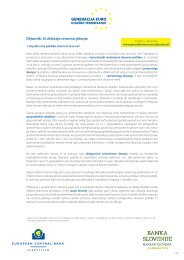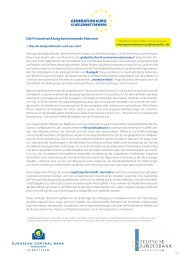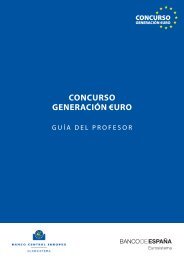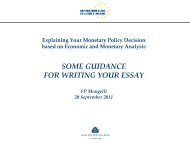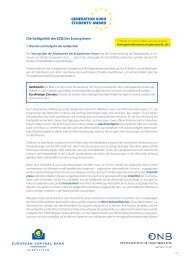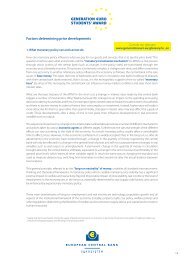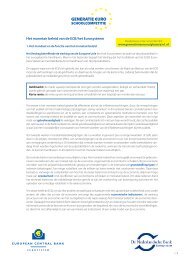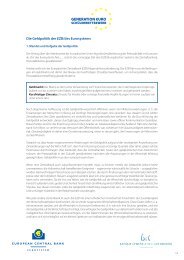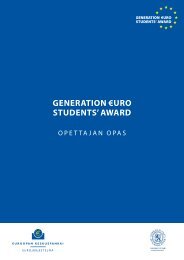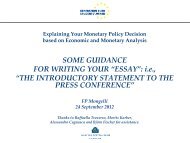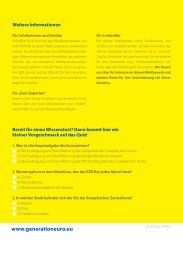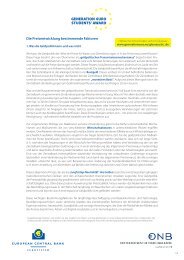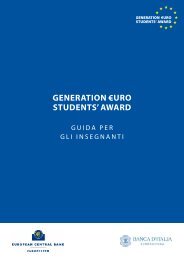Teacher's booklet - the Generation ?uro Students' Award
Teacher's booklet - the Generation ?uro Students' Award
Teacher's booklet - the Generation ?uro Students' Award
You also want an ePaper? Increase the reach of your titles
YUMPU automatically turns print PDFs into web optimized ePapers that Google loves.
<strong>Generation</strong> €<strong>uro</strong><br />
Students’ <strong>Award</strong><br />
1. Teachers<br />
2. Rounds<br />
Objective<br />
Your role<br />
Round 1: online quiz<br />
The <strong>Generation</strong> €<strong>uro</strong> Students’ <strong>Award</strong> aims to help secondary<br />
school students understand monetary policy and how<br />
it relates to <strong>the</strong> economy as a whole. They will gain an insight<br />
into <strong>the</strong> role of a central bank by learning about <strong>the</strong> function<br />
of monetary policy instruments, in particular interest rate<br />
decisions, and by using some of <strong>the</strong> data available to <strong>the</strong><br />
Governing Council of <strong>the</strong> E<strong>uro</strong>pean Central Bank (ECB)<br />
each month. The competition should also raise students’<br />
awareness of <strong>the</strong> E<strong>uro</strong>system and deepen <strong>the</strong>ir knowledge<br />
of <strong>the</strong> world of finance.<br />
Overview<br />
The competition consists of three rounds and will end with<br />
a E<strong>uro</strong>pean award event at <strong>the</strong> ECB in Frankfurt am Main.<br />
Participants<br />
The competition is aimed at students aged 16 to 19 who live<br />
in a e<strong>uro</strong> area country. Their ages may vary slightly from<br />
country to country (depending on <strong>the</strong> national education<br />
system), but <strong>the</strong>y should be in <strong>the</strong>ir final years of secondary<br />
education. All students are entitled to take part, irrespective<br />
of what <strong>the</strong>y are studying.<br />
Students will be required to form teams of five and to<br />
nominate a teacher to accompany <strong>the</strong>m. Each team should<br />
come from <strong>the</strong> same school, with <strong>the</strong> teachers and students<br />
<strong>the</strong>mselves deciding on membership. Each team should<br />
also nominate one of its members as team leader. The<br />
teacher should work at <strong>the</strong> school taking part in <strong>the</strong><br />
competition and teach at least one member of <strong>the</strong> team.<br />
The composition of <strong>the</strong> team should not be changed<br />
during <strong>the</strong> competition unless extraordinary circumstances,<br />
such as illness, prevent this.<br />
Rounds<br />
Round 1. Online quiz: <strong>the</strong> quiz consists of three levels –<br />
beginners, intermediate and expert – with a total of<br />
30 questions. Students must answer <strong>the</strong> questions as a<br />
team. The teams with <strong>the</strong> best scores will be invited to<br />
participate in <strong>the</strong> second round (essay round).<br />
Round 2. Essay: in this round, teachers have to actively<br />
coach <strong>the</strong>ir students. Each team will be asked to assess <strong>the</strong><br />
economic conditions in <strong>the</strong> e<strong>uro</strong> area and <strong>the</strong> inflation<br />
outlook on <strong>the</strong> basis of some of <strong>the</strong> data available to <strong>the</strong><br />
Governing Council of <strong>the</strong> ECB. Teams should make an<br />
assessment and <strong>the</strong>n decide on <strong>the</strong> level at which to set<br />
<strong>the</strong> key interest rate. They will need to explain <strong>the</strong>ir<br />
decision in an essay of no more than 2,000 words. The<br />
essays must be uploaded to <strong>the</strong> <strong>Generation</strong> €<strong>uro</strong> website<br />
(www.generatione<strong>uro</strong>.eu).<br />
Round 3. Presentation: in this round, five of <strong>the</strong> best<br />
teams from <strong>the</strong> essay round will be invited to give a<br />
presentation on <strong>the</strong>ir interest rate decision to a jury of<br />
experts, who will <strong>the</strong>n choose <strong>the</strong> winning team. In both <strong>the</strong><br />
essay and <strong>the</strong> presentation, <strong>the</strong> interest rate decision should<br />
reflect <strong>the</strong> economic circumstances at that time, i.e. it should<br />
be a real-time decision.<br />
Your main task is to be <strong>the</strong> team coordinator, teaching<br />
and guiding your students through each round of <strong>the</strong><br />
competition, in particular <strong>the</strong> essay round, in order to ensure<br />
<strong>the</strong>ir work is consistent and of a good standard. If your team<br />
is successful, you should also accompany <strong>the</strong>m to <strong>the</strong> ECB<br />
for <strong>the</strong> final presentation round.<br />
Resources<br />
You will have access to a number of resources to guide<br />
and support your students through each round of <strong>the</strong><br />
competition. Your main resources will be:<br />
■■<br />
<strong>the</strong> teacher’s <strong>booklet</strong> (<strong>the</strong> very document you are<br />
reading now), which sets out <strong>the</strong> rules and organisational<br />
procedures for <strong>the</strong> competition;<br />
■■<br />
<strong>the</strong> teachers’ day, held at <strong>the</strong> ECB, where you can learn<br />
more about <strong>the</strong> organisational procedures and ask any<br />
questions you may have. You will also be given <strong>the</strong><br />
information you require to guide your students<br />
through <strong>the</strong> competition. The event is for all teachers<br />
participating in <strong>the</strong> competition;<br />
■■<br />
<strong>the</strong> <strong>Generation</strong> €<strong>uro</strong> website www.generatione<strong>uro</strong>.eu,<br />
which provides all competition-related information and<br />
materials to make it easier for you to teach <strong>the</strong> core<br />
concepts of monetary policy-making;<br />
■■<br />
materials from <strong>the</strong> ECB, such as press clippings, reports,<br />
etc.<br />
If students are taking <strong>the</strong> quiz in order to enter <strong>the</strong><br />
competition, <strong>the</strong>y must first register to ensure that <strong>the</strong>ir<br />
scores are saved. After registering, <strong>the</strong>y can only do <strong>the</strong> quiz<br />
once. The quiz consists of 30 questions: ten easy questions,<br />
ten harder ones and ten difficult ones. The 30 questions will<br />
be selected at random from a pool each time a student<br />
starts <strong>the</strong> quiz. Quiz scores, as well as <strong>the</strong> electronic<br />
certificates, can also be shared via social networking tools.<br />
The teams with <strong>the</strong> best scores can proceed to <strong>the</strong> next<br />
round and will be asked to register for that round. When<br />
doing so, <strong>the</strong>y will be required to enter a name for <strong>the</strong>ir team<br />
and supply <strong>the</strong> names and e-mail addresses of all <strong>the</strong> team<br />
members (including <strong>the</strong> accompanying teacher), as well as<br />
<strong>the</strong> name of <strong>the</strong> school that <strong>the</strong>y are representing.<br />
Round 2: essay<br />
Once teams of five students and <strong>the</strong>ir accompanying<br />
teachers have been registered, <strong>the</strong>y will be sent some<br />
general information on <strong>the</strong> essay that <strong>the</strong>y will be asked to<br />
write. It will refer to <strong>the</strong> economic and monetary data used<br />
as a basis for setting <strong>the</strong> interest rate and explain <strong>the</strong><br />
students’ task. This information will also be available on <strong>the</strong><br />
<strong>Generation</strong> €<strong>uro</strong> website.<br />
In <strong>the</strong> essay, <strong>the</strong> teams must clearly state <strong>the</strong>ir interest rate<br />
decision, as well as how <strong>the</strong>y came to that decision, based<br />
on <strong>the</strong>ir assessment of <strong>the</strong> key economic indicators<br />
available, <strong>the</strong> economic and monetary conditions in <strong>the</strong><br />
e<strong>uro</strong> area and <strong>the</strong> inflation outlook. The teams should refer<br />
to <strong>the</strong> website for all <strong>the</strong> information <strong>the</strong>y need for <strong>the</strong>ir task.<br />
The length of <strong>the</strong> essay must not exceed 2,000 words. The<br />
essay may be marked down if it is longer. All team members<br />
must be involved in writing <strong>the</strong> essay, which should reflect<br />
<strong>the</strong> opinion of <strong>the</strong> majority of <strong>the</strong> team.<br />
Teams must upload <strong>the</strong>ir essays to <strong>the</strong> <strong>Generation</strong> €<strong>uro</strong><br />
website. The essays will be assessed by a jury of ECB experts,<br />
who will <strong>the</strong>n select teams to proceed to <strong>the</strong> next round.<br />
Those teams will be notified accordingly by <strong>the</strong> ECB.<br />
4<br />
5



